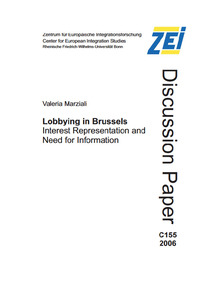Lobbying in Brusselsinterest representation and need for information

Lobbying in Brussels
interest representation and need for information

| dc.contributor.author | Marziali, Valeria | |
| dc.date.accessioned | 2022-07-14T14:34:41Z | |
| dc.date.available | 2022-07-14T14:34:41Z | |
| dc.date.issued | 2006 | |
| dc.identifier.uri | https://hdl.handle.net/20.500.11811/10068 | |
| dc.description.abstract | This paper is divided in six parts: after having presented the main categories of actors involved in lobbying and the targets of this activity of political pressure, it goes on to describe the reasons why interest groups lobby the EU. The fourth part is dedicated to the strategies and techniques of successful lobbying, while the fifth section wants to analyse the approach given by the European Commission to the consultation process with interest groups. The sixth part, on the contrary, focuses its attention on the question of the so-called ‘democratic deficit’ of the EU and on the possibility that lobbying can constitute a substitute for this lack. Finally, the paper tries to draw some conclusions. | en |
| dc.format.extent | 49 | |
| dc.language.iso | eng | |
| dc.relation.ispartofseries | ZEI Discussion Paper ; C155 | |
| dc.rights | In Copyright | |
| dc.rights.uri | http://rightsstatements.org/vocab/InC/1.0/ | |
| dc.subject | Europäische Union | |
| dc.subject | Lobbyismus | |
| dc.subject.ddc | 320 Politik | |
| dc.title | Lobbying in Brussels | |
| dc.title.alternative | interest representation and need for information | |
| dc.type | Arbeitspapier | |
| dc.publisher.name | Zentrum für Europäische Integrationsforschung (ZEI) | |
| dc.publisher.location | Bonn | |
| dc.rights.accessRights | openAccess | |
| dc.relation.pissn | 1435-3288 | |
| dc.relation.pisbn | 3-936183-55-4 | |
| dc.relation.url | https://www.zei.uni-bonn.de/de/publikationen/medien/zei-dp/zei-dp-155-2006.pdf | |
| ulbbn.pubtype | Zweitveröffentlichung |
Files in this item
This item appears in the following Collection(s)
-
ZEI Discussion Paper (284)




